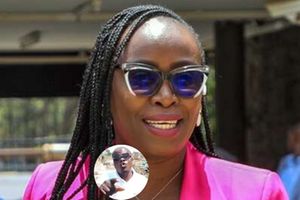Senegal police on guard after night of riots over Wade’s re-election bid

PHOTO | AFP | SEYLLOU
Senegalese opposed to the candidature of Abdoulaye Wade for highly disputed third term in office demonstrate on January 27, 2012 in Dakar. Posters translate as "Wade Free the people"
What you need to know:
- Policeman killed in opposition protests against decision to clear 85-year-old leader for third term
DAKAR
Riot police cordoned off streets in Dakar on Saturday after a night of violent riots that erupted when a court cleared octogenarian President Abdoulaye Wade to seek a third term and protesters vowed to force him from power.
A policeman was killed and government institutions attacked by opposition protestors on Friday night following the controversial decision.
Late Friday, the Constitutional Council cleared President Wade, 85, to run for another five-year term.
After the council’s ruling, thousands of opposition youth who had been waiting in several parts of Dakar and other major towns took to the streets and engaged in running battles with riot police.
In Dakar, a policeman was killed in the ensuing battles around the Place d’Obelisque.
In Kaolack, about 150 kilometres from Dakar, youths attacked and destroyed the vehicles of the national broadcaster. Violent protests were also reported in Matam, several hundred kilometres in the north.
Opposition leaders were unanimous in appealing to their supporters to pursue public demonstrations until President Wade rescinds his decision “to hijack the constitution and hold the Senegalese people to ransom for his whims and caprices”.
Besides President Wade, 13 other candidates were cleared while three, including celebrated musician, Youssou N’Dour, were disqualified.
N’Dour said he will petition the council’s decision.
Temper tantrums
Amid the resulting unrest, Wade told his opponents to stop throwing “temper tantrums”. He urged the opposition to respect the verdict of the council and prepare for the campaigns.
On Wednesday, he insisted that he maintained the right to contest the upcoming election and could even contest the one in 2017.
Meanwhile, the European Union has said it recognizes the verdict by the council and appealed to the opposition to resort to legal means in order to resolve the crisis and strive to maintain peace and stability.
“Wade rejoices, the country burns,” read the headline of the Walfadjiri newspaper while le Quotidien declared: “Wade burns Senegal.”
The June 23 Movement of opposition against Wade’s candidacy, which called Friday’s rally, appealed to Senegalese to march on the presidential palace in downtown Dakar to “remove Wade who is squatting there.”
N’Dour, who shocked the music world when he announced this month he was quitting singing for politics, was left off the list with the council saying thousands of signatures he provided could not be verified. A minimum of 10,000 were needed.
The singer warned in an interview with France 3 television that the approval of Wade’s bid “is going to create tension.”
“The opposition in its great majority does not support any fiddling with the constitution,” said the singer, adding the Senegalese people were “tired” of politicians flouting the law.
The ruling seals months of speculation over the interpretation of the constitution on presidential mandates.
Wade was first elected in 2000 for a seven-year mandate, and re-elected in 2007 under a new constitution for a five-year mandate.
He again revised the text in 2008, reverting to a seven-year mandate, renewable once.
Wade argues that the law does not apply retroactively and that he is allowed to run again.
Rights activists have warned against a repetition of violent riots in June last year, and clashes between rival parties in December that left one person dead.
Amnesty International has warned the “potential for destabilisation is huge”, and urged political leaders to make sure their supporters did not resort to violence.
On Friday, the 15-nation Economic Community of West African States appealed for calm and restraint in a statement expressing “serious concern for the rising tensions among political parties and citizens.”
US deputy assistant secretary of state for African affairs, William Fitzgerald, said Monday that Wade’s bid to stay in office was “regrettable”.
Senegal has long been seen as a good example of democracy in Africa, with previous leaders Leopold Sedar Senghor and Abdou Diouf peacefully handing over power.
Unlike many countries in the region, Senegal has never experienced a military coup.




